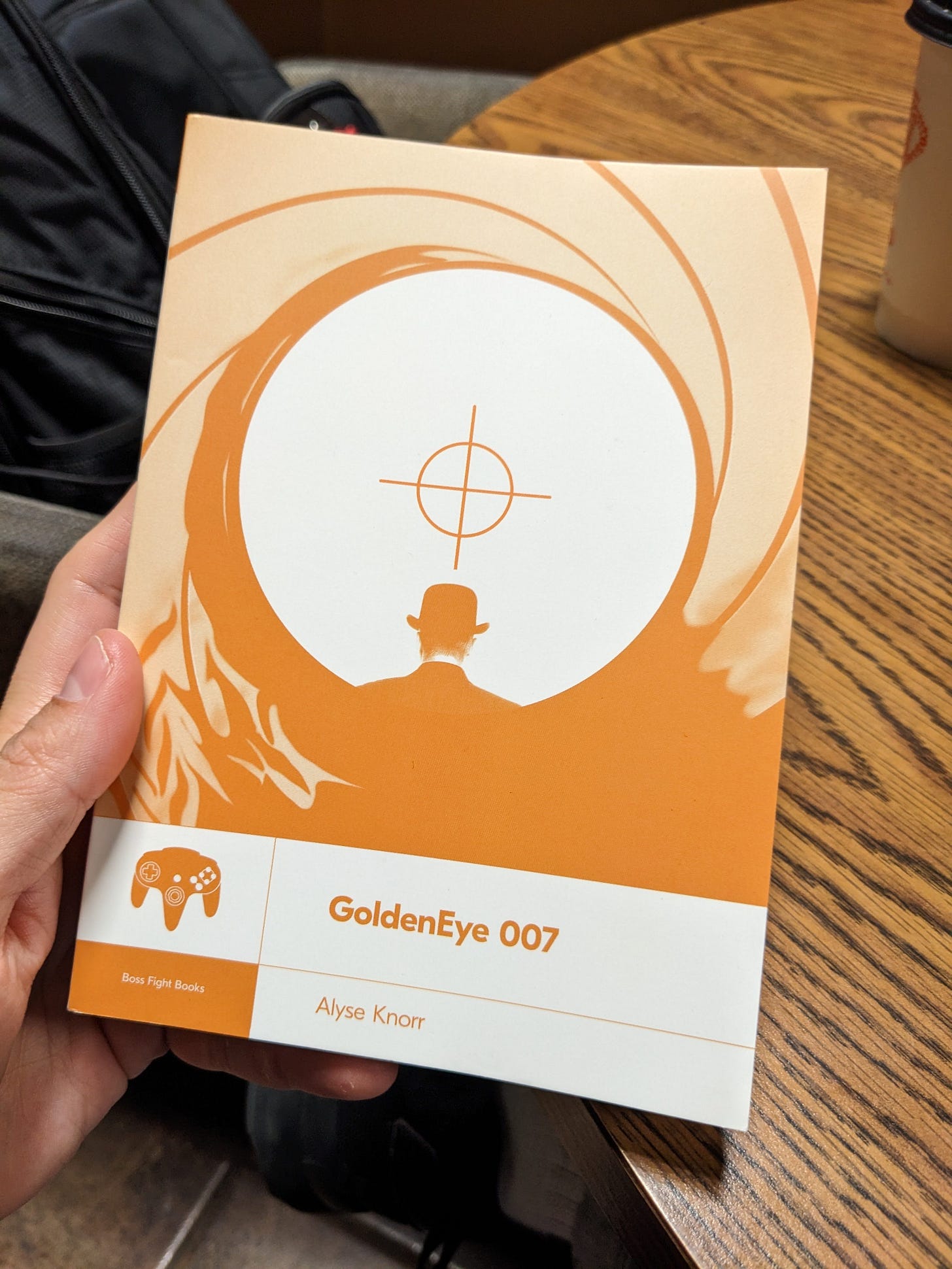When you love video games but not 'that' video game
A review of my dismissal of GoldenEye 007 (and a review of the book, GoldenEye 007 by Alyse Knorr)
GoldenEye 007 for the Nintendo 64 was released in 1997. I was released for the Ross family household in 1982. Therefore, I was perfectly of age to get caught up in the cultural storm ushered in by GoldenEye 007. It did a lot of things right: it proved that first-person shooters could be successful on consoles (on a Nintendo console, nonetheless). It proved that licensed games didn’t have to be garbage. Unfortunately, it also proved that competitive multiplayer shooters on consoles could be widely appreciated. My response to this last proof was to smile along as magazines dedicated entire columns to the game and as friends dedicated entire conversions to the game.
My aversion to player-versus-player games superseded (and still today, supersedes) any cultural zeitgeist, despite my love of video games and my obsession with following the industry. To put this into perspective: I listen only to video game podcasts while driving. I haven’t heard an actual song in my car since 1925 when I’d drive Opera Singer Adelina Patti around in the back of my Ford Model T Runabout. The entire neighborhood hated me. Opera singers can’t really do low-volume. Also, none of that is true, except for the “I listen only to video game podcasts while driving.” But you knew that. I already said I was born in 1982, which, according to math, is well after 1925.

I love video games, but there are certain genres I just don’t care about. And that’s expected. We can’t all love everything. But something feels false about loving only part of something but still claiming to love the thing entirely. It feels false even though it also makes complete logical sense. Loving something implies a full understanding of that thing, which, if you are a thoughtful person, means of course you’d then be capable of dissecting the thing enough to reveal—and admit to—its faults. I think this is what they call a catch-22. It’s impossible to truly love something because at some point you should know the thing well enough to see the elements that are incompatible with you. The human brain has trouble with this kind of ambiguity.
This strange crevasse is where GoldenEye 007 has wedged itself since 1997. I never liked the game. Not even a little bit. It could be that I never owned a Nintendo 64 during the game’s heyday, and so all of my play sessions were against more practiced, console-owners. It could be that I’ve never been a competitive person…ever. Once, in Junior High, I pretended to be competitive by crying after a basketball game loss (because that’s what I’d see the star of the team—a very competitive person—do several times), and even during the cry I thought “well, this is stupid.”
Here is where Alyse Knorr’s book GoldenEye 007, the 29th non-anthology book in the amazing Boss Fight Books catalog, comes to crowbar the game out (crow the game out?) of its 22nd catch crevasse. The entire Boss Fight Books catalog has been so enjoyable that even when a book is released whose subject title I have no personal connection to (or have outright hated toward) I still read the book. And with GoldenEye 007, I think I finally understand why I find these untethered books so enjoyable: they close that catch-22 gap by allowing me to appreciate a game even if I don’t like the game.
Knorr doesn’t simply offer a rote development history of the game. So much time is given to the developers themselves to speak, seemingly untethered by NDAs. So often the development team comes across like antsy creatives ready to explode at the mere hint that someone like Knorr cares about all the stumbles, successes, and creative approaches they took during development, especially as a relatively small development team (about 12 people). This is a rag-tag group of geeks who are genuinely gleeful when reminiscing about their strange path toward video game superstardom.
For example, at one point the team considered leveraging the Nintendo 64’s Rumble Pak as a gun magazine analog. The player would slam the Rumble Pak in to reload the on-screen gun.

Or consider this: a bug during production caused the player’s gun to be swapped with the Depot level’s fence asset, so when trying to throw the gun, a fence would be thrown instead. The team played a few rounds of “fence deathmatch” before properly fixing the bug. In today’s world, where Goat Simulator and The Legend of Zelda: Tears of the Kingdom exist, I think a wacky sandbox approach to a James Bond game would work pretty well.

Oh, and you know that distant island in the Dam level, the one you can see just barely through the lens of a sniper rifle scope? Yes, that was originally meant to be a playable area, accessible by a (scrapped) boat mechanic.
Alyse Knorr’s GoldenEye 007 is not just well-researched, it’s not just well written, it’s a damn-fun read. The number of straight-from-the-dev factoids alone is enough to make this book a must-buy for creators of listicles about video games.
Most of all Alyse Knorr’s GoldenEye 007 makes me…dare I say…appreciate GoldenEye 007.






I recently downloaded an N64 emulator specifically for Goldeneye and Perfect Dark. It maps the mouse to the analog stick movement, so you can aim with a mouse. It's an amazing experience. And much much easier. You have to use custom difficulty to make it a challenge.